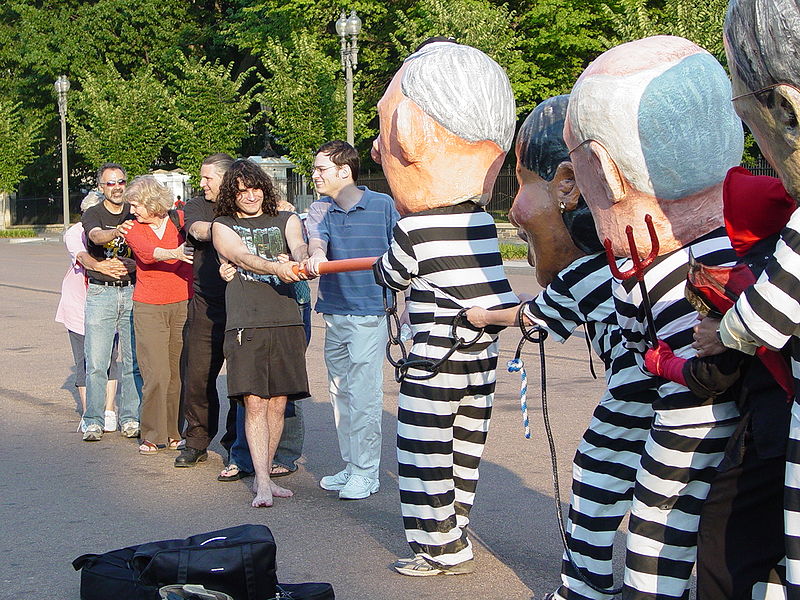 Image: commons.wikimedia.org
Image: commons.wikimedia.org.
OLYMPICS TRIVIA
.
[ Includes Track and Field Sports ]
.
Not every Olympic event has been a success. Some, like live pigeon shooting and equestrian high jump, lasted just one year. Here’s a look at some other sports no longer in the Olympic program:
.
Rope climb (1896, 1904, 1924, 1932): Using only their hands, competitors try to see how fast they can get to the top of the rope.
.
One-hand weightlifting (1896): Similar to the modern snatch event, but athletes were only allowed to use one hand.
.
Tug-of-war (1900-1920): Two teams of eight try to pull a rope six feet; if neither team reaches the mark after five minutes, the team that pulls the farthest wins.
.
Standing high jump (1900-1912): Same as the traditional high jump, only without a run-up.
.
Standing broad jump (1900-1912): The long jump without a run-up.
.
Standing triple jump (1900-1904): Also known as the hop, step and jump; started from a stationary position.
.
Underwater swimming (1900): Swimmers were awarded points for how far they went and how long they stayed under water.
.
Swimming obstacle race (1900): Racers had to swim through the River Seine, climb up and down a pole, then go over and under several boats.
.
Live pigeon shooting (1900): The birds were released and shooters tried to kill as many as possible.
.
Equestrian high jump (1900): Riders see who can jump the highest on horseback.
.
Equestrian long jump (1900): Long jumping on horseback.
.
Basque pelota (1900): A form of handball played mostly on the border of Spain and France.
.
Rugby union (1900, 1908-24): One of the most popular team sports in the world still waiting to get back into the Olympics.
.
56-pound weight throw (1904, 1920): A 56-pound weight affixed with a handle that’s thrown over a pole vault bar.
.
All-around dumbbell contest (1904): Competitors performed 10 different lifts with dumbbells over two days.
.
Club swinging (1904): Similar to rhythmic gymnastics, only the competitors swing clubs around their bodies.
.
Plunge diving (1904): From a standing position, divers see how far they can go without taking a stroke.
.
Duelling pistol (1906): Shooters fired at mannequins wearing frock coats and bull’s-eyes on their chests.
.
Motor boating (1908): Three categories of races in boats; IOC later decided against allowing anything with a motor.
.
Jeu de paume (1908): Similar to squash, only competitors use their hands instead of a racket to strike the ball.
.
Plain high diving (1912-24): Divers were not allowed to do any acrobatic moves; they just dove straight into the water.
.
Tumbling (1932): Athletes do flips and twists along a two-foot-wide strip; now part of the modern gymnastics floor exercise.
.
Solo synchronized swimming (1984-92): Swimmers were awarded points based on routines synchronized to music.
=========================


No comments:
Post a Comment